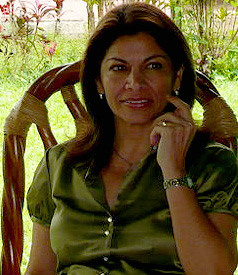Honest, paywall-free news is rare. Please support our boldly independent journalism with a donation of any size.
Laura Chinchilla won Costa Rica’s presidential election in a landslide victory Sunday that is eliciting cheers from women across Central America.
San Jose, Costa Rica; and Panama City – Center-right politician Laura Chinchilla is set to become Costa Rica’s first woman president after a landslide victory Sunday that is invigorating women in the tiny Central American nation and beyond.
Ms. Chinchilla received 46.8 percent of the votes, winning Sunday’s presidential election in the first round. Her closest competition, left-leaning candidate Ottón Solís, captured just 25.1 percent of votes. Close on his heels in third place was Libertarian candidate Otto Guevara who received 20.9 percent.
“It’s a significant moment in Costa Rica’s history, to have a woman president,” says Fernando Zeledón, political science professor at the University of Costa Rica. “It’s a new chapter in history.”
With her parents, husband, and 13-year-old son standing behind her, Chinchilla accepted the presidential victory Sunday night by pledging to make Costa Rica the first developed country in Central America, confirming her commitment to the goal to go carbon neutral by 2021, and promising to improve health and citizen safety. She asked Costa Ricans “to help to bring forward this immense responsibility.”
Her speech was also one of gratitude as she thanked campaign workers and voters for “making it possible for a daughter of Costa Rica to, today, be president of the country.”
Vote Reverberates Across the Region
“I couldn’t be happier” says Chinchilla fan Laura Urena, wrapped in a National Liberation Party flag at the victory celebration. “It’s the first time in the history of Costa Rica that we will have a woman president. It will give new opportunities to women all over the country.”
Chinchilla is not Central America´s first female president. Nicaragua was led by Violeta Chamorro in the 1990s. Nearly a decade later, Panama elected Mireya Moscoso, its first female president.
Still, Chinchilla’s victory is already reverberating among women across the region.
“[President Moscoso] opened the doors for our gender to show its capabilities,” says Laura Rangel, a hotel receptionist in Panama City. And she says Chinchilla´s victory in Costa Rica will inspire women throughout Central America. “It is marvelous. It is an example for all underdeveloped countries that they can be run by a woman, not just a man.”
Why Chinchilla Won
Chinchilla, a former vice president and public security minister, led polls since her campaign was launched in June. Her popularity owes in part to her predecessor, Oscar Arias, a second-term president and Nobel Peace Prize winner who recently made headlines for his role in the Honduran mediation process and who boasts a 73 percent approval rating.
“Oscar Arias’s government has been a successful one and the only option to carry that forward is to elect Laura,” says Esteban González, a 28-year-old archivist, who campaigned outside a voting station for her throughout the day.
Mr. Zeledón says a series of factors led to her clear victory Sunday. “Laura drew her support from many areas. There were some who wanted to see a woman president and others who wanted continuity in the government. The rest of her support was a result of the machine that is the National Liberation Party,” he says, explaining that party organization and favor with the voters secured her a wide margin.
Often described as an independent thinker and skilled diplomat, Chinchilla found support on the campaign trail from voters such as Xinia Vargas Alvarado.
“Costa Rica is ready for a woman president,” says Ms. Vargas Alvarado, outside a polling station Sunday. “We think she will do a better job with … issues of childcare, single motherhood, and housing.”
Yirlamia Pessoa who came to the polls with her two daughters, Danisha and Yariela, agrees. “We think she will better understand the issues facing women,” she says.
Who She Is
Born in Desamparados, a working class suburb of the capital San José, Chinchilla grew up watching her father navigate the political scene as the country’s comptroller for 15 years. The eldest of four children and only daughter, she studied political science at the University of Costa Rica and continued her education at Georgetown University where she received a master’s degree in public policy.
Back in Costa Rica she worked as a consultant on issues relating to security and judicial reform and held her first public office at age 35 as vice minister of public security. Two years later, she became minister of public security, the first woman to serve in that capacity. She was elected to the legislative assembly for a four-year term in 2002 and then served as vice president under President Arias.
Speaking against the authoritarian crackdown
In the midst of a nationwide attack on civil liberties, Truthout urgently needs your help.
Journalism is a critical tool in the fight against Trump and his extremist agenda. The right wing knows this — that’s why they’ve taken over many legacy media publications.
But we won’t let truth be replaced by propaganda. As the Trump administration works to silence dissent, please support nonprofit independent journalism. Truthout is almost entirely funded by individual giving, so a one-time or monthly donation goes a long way. Click below to sustain our work.
